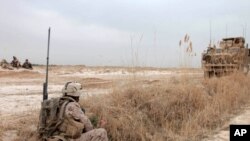The word Moshtarak means "together" in the Dari language. On February 13th local time, more than 15,000 Afghan and ISAF troops and police, including forces from the UK, U.S., Canada, Denmark and Estonia, together launched Operation Moshtarak.
The operation, conducted at the request of the Afghan government and the Governor of Helmand, is a united international civil-military effort - some 120 international civilians are supporting efforts in Helmand - in support of the Afghan government and people.
Operation Moshtarak will extend and consolidate the authority and influence of the Afghan Government in central Helmand, removing the largest remaining safe havens in the area for Taliban, insurgents and narco-criminals.
By clearing the area of what is believed to be some of the largest IED factories, it will also remove the source of the deadliest attacks against Afghan civilians and our joint security forces. It will improve freedom of movement along key transportation arteries that are critical to the local economy.
The planning of Operation Moshtarak included numerous consultations at shuras, or gatherings of elders and community leaders, because a key part of the civilian-military strategy is to not only defeat the insurgency, but to address Afghan priorities. Only after planners were assured that the population supported the eviction of the Taliban did the Afghan and Coalition forces move forward with the operation. And once the area was secure, the second part of Operation Moshtarak began: namely, delivering stability, as well as goods and services, for the people of Helmand Province.
Operation Moshtarak is making progress - the District Support Team (DST), comprised of U.S. and U.K. civilians, deployed to Marjah on February 23 and is already implementing programs in support of the Afghan government’s efforts to deliver governance and stability to Marjah. Coalition forces are operating under strict rules of engagement to prevent civilian casualties. Coalition soldiers may not fire at an unarmed Afghan, even if they suspect that person is an insurgent who simply dropped his weapons. But despite such precautions, civilian casualties do occur. But by far, the number one killer of civilians continues to be insurgent suicide attacks and roadside bombs.
Only when the extremists leave, or lay down their weapons, will that danger subside. The civilian population can help by persuading Taliban fighters to take part in reintegration efforts led by the Afghan government.
Importance Of Operation Moshtarak

The operation, conducted at the request of the Afghan government and the Governor of Helmand, is a united international civil-military effort.



